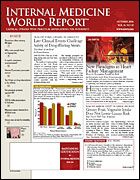Publication
Article
Internal Medicine World Report
DREAM: Rosiglitazone Reduces Risk of Progression to Diabetes
Author(s):
From the European Association for the Study of Diabetes Lifestyle Modifications, TZD Therapy May Halt the Epidemic
COPENHAGEN, Denmark—The thiazolidinedione (TZD) rosiglitazone (Avandia) reduced the risk of progression to diabetes in 60% of prediabetic patients, investigators reported at the European Association for the Study of Diabetes annual meeting.
The DREAM (Diabetes Reduction Assessment with Ramipril and Rosiglitazone Medication) trial evaluated diabetes progression over a median of 3 years among 5269 patients diagnosed with prediabetes.
“Diabetes is a growing epidemic, and we need to identify ways to prevent its onset. This study shows that rosiglitazone can be used to do just that, and it has the potential to become one of the ways we prevent onset of this terrible disease,” said lead investigator Hertzel Gerstein, MD, of McMaster University, Hamilton, Ontario, at a briefing held immediately before the data were formally presented at the meeting.
He added, “If we can prevent the onset of diabetes, we will also help prevent cardiovascular, eye, kidney, and other consequences of the disease. The DREAM results indicate that, in addition to lifestyle counseling, rosiglitazone therapy significantly lowers the chance that people at high risk for the disease will develop it.”
This international, multicenter 2x2 factorial trial involved 191 sites in 21 countries and was designed to answer the question: “Does ramipril 15 mg/day and/or rosiglitazone 8 mg/day prevent type 2 diabetes?”
Results from the rosiglitazone arm were published in the Lancet (2006; 368;1096-1105), and results from the ramipril arm were published in the New England Journal of Medicine (Online before print. 2006 Sep 15).
Eligibility for en-rollment included impaired fasting glucose and/or impaired glucose tolerance but no history of diabetes, cardiovascular disease, or intolerance to either angiotensin-converting-enzyme inhibitors such as ramipril (Altace) or TZDs such as rosiglitazone.
Participants (median age, 55 years) had rising blood glucose levels but did not have diabetes. They were randomized to rosiglitazone (8 mg/d) or placebo, and to ramipril (15 mg/d) or placebo. Each patient was evaluated every 6 months for 3 years.
The DREAM study was not designed to compare rosiglitazone with ramipril.
A total of 10.6% of patients receiving rosiglitazone progressed to type 2 diabetes compared with 25% of those receiving placebo. For the primary end point of development of diabetes or death from any cause, rosiglitazone achieved a 62% risk reduction relative to placebo (P <.001).
During a median of 3 years of follow-up, blood glucose levels regressed to normal in 51% of rosiglitazone patients and 30% of placebo patients; the rosiglitazone group was approximately 70% (P <.001) more likely to return to normal blood sugar levels.
Notably, the risk of diabetes onset did not increase with body mass index among the rosiglitazone recipients.
Ramipril treatment did not reduce the risk of diabetes; the disease developed in 18% of ramipril recipients and 20% of placebo recipients. How ever, significantly more ramipril patients (43%) than placebo patients (38%) achieved normal glucose levels at the end of 3 years.
One downside to the otherwise-positive news was 14 incident cases of congestive heart failure among those receiving rosiglitazone.
“None of the cases was fatal,” said Dr Gerstein, “and we don’t know yet if this drug-induced heart failure is the same as natural heart failure, in terms of reversibility.” He added, “We will be following these patients closely. What we do know is that the key to understanding this problem is to follow it and to learn how to deal with it.”
Steven Kahn, MD, professor of endocrinology at the University of Washington in Seattle, told IMWR, “We now have the addition of a drug option that is, however, not yet approved specifically for this purpose. We will be looking for a rigorous evaluation of all DREAM data by groups that direct standards of care worldwide. Even with this good news, we have to be clear that our lifestyles are not what they should be, and that diet and exercise are the proven ways to slow or halt the onset of diabetes.”





